
3 minute read
Evil Knows No Limits: The Reality of Auschwitz
Dear Reader, I hope this letter finds you in good health and that from this letter you can learn not to repeat the mistakes made more than 70 years ago.
It’s Saturday, the Council knocks on your door, they tell you to bring all your things and that you need to move somewhere else for a short amount of time. They tell you to hurry and to bring only your essentials, so you grab your house keys (because you will need them when you get back home), things for cooking and something of value to you, perhaps a picture. You are then taken to High Wycombe train station. You ride a train for nine days, without stopping, and arrive confused in the dark with dogs barking and people shouting. This was the fate of many people during the Holocaust, except they would never return to their European homes in Yugoslavia, Hungary, Greece, Norway, Poland… they would be gassed in Auschwitz-Birkenau. What remains of one individual is only their house keys, they were expecting to go home, as you and I would at the end of the day. They didn’t expect to die in room full of people, under a seemingly normal looking train station, their body lost forever after being cremated and the ashes lost. There are no graves for the 1.1 million, predominantly Jewish, people killed at Auschwitz-Birkenau.
Advertisement
There are no limits to evil. That is one thing that I have learnt from my trip to Auschwitz. Nothing can prepare you for entering those camps. The sense of dread I experienced throughout the day was something that I can’t compare to a feeling I’ve had before. When people say you must experience Auschwitz to understand it, please believe me when I say that there are no words to describe that place, but for you, dear reader, I shall try.
On the site of Auschwitz I, the first and original camp, there is a house with a swimming pool. The said house once belonged to the longest standing commandant of Auschwitz, Rudolf Höss. He, his wife and his five children lived there. His wife once called the place ‘paradise’.
At first this sounds incomprehensible, but if you put it into context, it can seem alarmingly ‘normal’. One of your parents gets a job somewhere far away, it’s only natural that the rest of the family would relocate too. As a father, Höss cared for his family and wanted to do more for them, only his work kept him busy. Indeed, when asked how she remembered her father, one of Höss’ daughters (Brigitte) details him reading fairy stories to them in the garden and remarked: “ He was very good to us”. This presents a problem. Although Rudolph Höss’ job was something unimaginably evil, as a father, he was somewhat ‘normal’ - which presented me with a complex problem. If the Nazis weren’t psychopathic killers, and were capable of being somewhat ‘human’, how did this happen? As I was crying into my friend’s arms the next day, that is what I muttered, over and over, ‘How could this happen?’ How?’ How could a human commit such atrocities to other humans?
And I still do not have an answer. There is no answer. Surely, they knew it was wrong? That’s what I fear the most: that they had a conscience, and still did it. That is the problem. If this happened then, it could easily happen again.
Even more incomprehensible was the machine-like manner in which the mass extermination occurred, dehumanising the Jewish prisoners in such a way, that they became treated in a way that was almost sub-human. Jewish people became so dehumanised, they became faceless. This is what the visit to Auschwitz helps to ease, the facelessness, the prisoners become people, not just prisoners.
In Auschwitz, there are pictures of children, in particular a 14 year old girl called, ‘Czeslawa Kwoka’ whose picture is in Block No. 6. The picture is something I wish to burn from my mind. Her lip is bruised and bloody, and there are tears in her eyes. She was murdered within 4 months of that picture being taken. The photographer, Wilhelm Brasse, recounts this, ‘She was so young and so terrified. The girl didn’t understand why she was there and she couldn’t understand what was being said to her. So this woman Kapo (a prisoner overseer) took a stick and beat her about the face. This German woman was just taking out her anger on the girl. Such a beautiful young girl, so innocent. She cried but she could do nothing.






